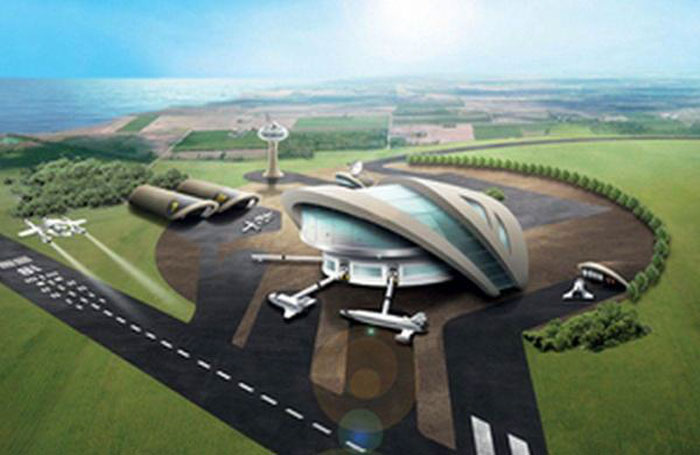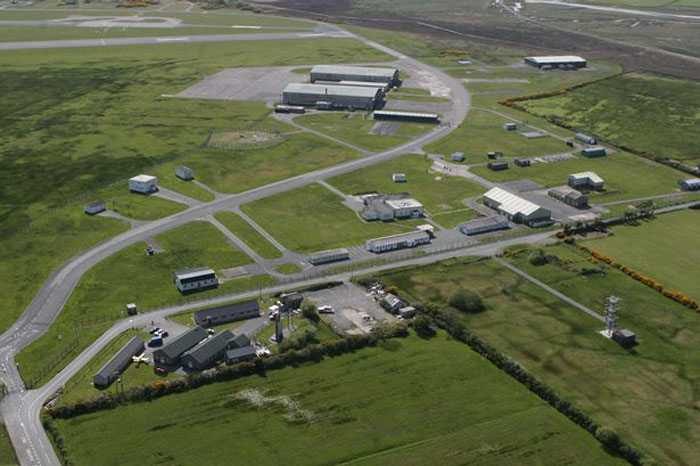.
Plans to build a UK spaceport have been approved by the government. Science Minister David Willets says he wants a spaceport up and running in the next five to ten years, to capitalise on the growing space tourism industry.
The plans form part of the government's wider strategy to grow the UK space industry to £40billion by 2030. The announcements were made in response to an industry report published last year called the Space Innovation and Growth Strategy Action Plan.
Willetts said the space sector could 'propel' UK growth. "Space industries already support 95,000 full time jobs and generate £9.1bn for the economy each year, and our response to the Growth Action Plan shows our commitment to secure its future growth and realise ambitions to develop a viable UK spaceport for commercial space flight," he commented.
It is hoped that Virgin Galactic and other emerging space tourism companies will start operating services from the new port, which will also act as a satellite launch centre.
No sites have been allocated as yet, although Willets said it was unlikely that the launchpad would be located in the south east. "We want an area where there is not much civil airspace, where it is not very busy," he continued. "It might be smaller airports, it might be underused or disused RAF airfields. We're starting to look at relatively remote parts of the country."
Quelle: EUREKA
.
Government backs plans for UK spaceport

Commercial space flights could launch from a UK spaceport as part of range of measures designed to help shape the future of Britain’s growing space industry.
The Government Response to the Space Innovation and Growth Strategy (IGS) Action Plan 2014 – 2030 and the National Space Security Policy (NSSP) set out plans to achieve a £40bn UK space industry by 2030 and a coherent approach to protecting the UK’s space assets.
In a statement David Willetts, minister for universities and science, said: ‘The space sector continues to thrive, and is one of our Eight Great Technologies with the potential to propel UK growth.
‘Space industries already support 95,000 full time jobs and generate £9.1bn for the economy each year, and our response to the Growth Action Plan shows our commitment to secure its future growth and realise ambitions to develop a viable UK space port for commercial space flight.’
The government said it has broadly welcomed the suggestions made in the IGS and in addition to committing stronger support for export and agreeing further work to improve regulatory framework for space activity, the response also incorporates measures to create and sustain new business in related markets.
The National Space Security Policy sets out an approach to the UK’s space security interests, outlining measures to make Britain more resilient to the risk of disruption to space services and capabilities. It is also intended to enhance national security interests through space, promote a safe and more secure space environment, and enable industry and academia to exploit science and grasp commercial opportunities.
Philip Dunne, minister for defence equipment, support and technology, said: ‘This policy is about galvanising our skills, our resources and our raw talent to promote resilience to the risks of operating in space – in both the civilian and military spheres.’
In implementing the National Space Security Policy, some of the early priorities will include mapping the UK’s dependency on space across government, critical infrastructure and key industrial sectors and assessing the extent of resilience in each of these fields. There will also be collaboration across government and with national and international partners to share capability where it is possible to do so, particularly in the fields of tracking space debris and near Earth objects.
Actions emerging from the IGS include:
- The Government will finalise the changes to the Outer Space Act limit on third party liability as soon as possible, and the UK Space Agency will review the UK approach to regulation of cubesats and other small satellites. This will improve the UK space sector’s international competitiveness.
- The UK Space Agency will simplify the process of obtaining satellite licenses, including working with Ofcom to see if a commitment to a swifter and more seamless process could be delivered and reviewing the economic cost of delivering the space licensing regime and fees.
- Government will continue work to deliver a regulatory environment that promotes enterprise and inward investment in the UK. This response acknowledges the challenges of a global market and the Government will work with new entrants into the market to ensure that inward investment means the creation of jobs and returns for the UK economy.
- In July 2014, the UK Space Agency will issue the first results from the work of a cross-government National Space Flight Coordination Group that was set up to take forward the ambition of developing a UK space port and starting commercial space flight from the UK.
- The UK Space Agency will double the funding level of the UK Space for Smarter Government Programme annually from April 2014. The programme will unlock the potential of space to make the delivery of public sector services more effective and efficient.
Quelle: theengineer
.
Update: 3.03.2015
.
Newquay still in the running for first UK spaceport

Plans for Britain to be home of Europe’s first spaceport moved a step closer today, with Newquay still in the running to host the futuristic base.
Publishing the outcome of a 3 month consultation with a range of interested parties, the government confirmed widespread support for its plans. This paves the way towards making commercial spaceflight operations in the UK a reality.
The Civil Aviation Authority (CAA) shortlisted a number of possible locations for the spaceport in July 2014 and this has today been updated. Newquay is among the sites shortlisted sites, with Campbeltown, Glasgow Prestwick, Stornoway in Scotland, and Llanbedr in Wales also in the running. RAF Leuchars was also confirmed as a potential temporary facility.
The government has ruled out two airfields at RAF Lossiemouth and Kinloss Barracks for operational reasons, given their "vital role in defence". Other locations can still be submitted if operators believe they can fulfil the requirements.
Aviation minister Robert Goodwill said: I want Britain to lead the way in commercial spaceflight. Establishing a spaceport will ensure we are at the forefront of this exciting new technology.
"Today’s consultation response marks another step forward in our work to support this emerging industry, which will create jobs and drive economic growth.
Business Secretary Vince Cable said: Paving the way for a national spaceport is one of our biggest science achievements in this parliament. It greatly underscores the work of our space innovation and growth strategy to position the UK as a world-leader in this exciting arena that is expected to be worth up to £400 billion a year to the global economy by 2030.
"Launching satellites and operating commercial space flights from our shores was once only confined to the depths of science fiction, but with the results of this consultation we are one step closer to making this a very real ability in the near future.
Work to establish the feasibility of a UK spaceport began in 2012, when the Department for Transport and UK Space Agency asked the CAA to review the operational environment and regulations to allow spaceplanes to operate.
Last year, the government launched its space innovation and growth strategy 2014 to 2030, which set out the economic advantages of the UK becoming a European focal point for the pioneers of commercial spaceflights and scientific research.
The next step is for the DfT to develop a detailed technical specification of spaceport requirements, prior to inviting proposals. This is due to be published later this year.
Quelle: thePacket
.
Industry backs government’s spaceport plans
A spaceport consultation outcome has been published, paving the way to make UK commercial spaceflight operations a reality.
Plans for Britain to be home of Europe’s first spaceport moved a step closer today, (3 March 2015).
Publishing the outcome of a 3 month consultation with a range of interested parties, the government confirmed widespread support for its plans. This paves the way towards making commercial spaceflight operations in the UK a reality.
The Civil Aviation Authority (CAA) shortlisted a number of possible locations for the spaceport in July 2014 and this has today been updated. The shortlisted sites are now Campbeltown, Glasgow Prestwick and Stornoway in Scotland, as well as Newquay in England and Llanbedr in Wales. RAF Leuchars was also confirmed as a potential temporary facility.
The government has ruled out 2 airfields at RAF Lossiemouth and Kinloss Barracks for operational reasons, given their vital role in Defence. Other locations can still be submitted if operators believe they can fulfil the requirements.
Aviation minister Robert Goodwill said:
I want Britain to lead the way in commercial spaceflight. Establishing a spaceport will ensure we are at the forefront of this exciting new technology.
Today’s consultation response marks another step forward in our work to support this emerging industry, which will create jobs and drive economic growth.
Business Secretary Vince Cable said:
Paving the way for a national spaceport is one of our biggest science achievements in this parliament. It greatly underscores the work of our space innovation and growth strategy to position the UK as a world-leader in this exciting arena that is expected to be worth up to £400 billion a year to the global economy by 2030.
Launching satellites and operating commercial space flights from our shores was once only confined to the depths of science fiction, but with the results of this consultation we are one step closer to making this a very real ability in the near future.
Work to establish the feasibility of a UK spaceport began in 2012, when the Department for Transport and UK Space Agency asked the CAA to review the operational environment and regulations to allow spaceplanes to operate.
Last year, the government launched its space innovation and growth strategy 2014 to 2030, which set out the economic advantages of the UK becoming a European focal point for the pioneers of commercial spaceflights and scientific research.
The next step is for the DfT to develop a detailed technical specification of spaceport requirements, prior to inviting proposals. This is due to be published later this year.
Quelle: GOV.UK
.
Update: 5.03.2015
.
Llanbedr airfield could become Europe's first spaceport
.
Plans for a little-known Gwynedd airfield to become Europe’s first spaceport moved a step closer today.
The former RAF base at Llanbedr airfield, near Harlech has been earmarked as a possible runway to launch futuristic “rocket planes” to carry passengers into space.
Although plans are still in the development stages, Westminster and Welsh Government ministers want to pave the way towards making commercial spaceflight operations in the UK a reality.
Llanbedr has already been identified as a centre of excellence for drone testing, which drew protests from anti-drone campaigners last year.
The location of the spaceport would depend on a number of factors but both governments are looking for a base that would limit the danger and inconvenience to the public.
That is why the six preferred sites are all on the coast.
Today, the Civil Aviation Authority (CAA) shortlisted Llanbedr as well as Campbeltown, Glasgow Prestwick and Stornoway in Scotland and Newquay in England.
RAF Leuchars was also confirmed as a potential temporary facility.
Two airfields at RAF Lossiemouth and Kinloss Barracks were ruled out for operational reasons.
According to one source, spaceplane systems may need runway lengths of 3,000m or more. Llanbedr is 2,200-2,499m. Of the six, only Campbeltown is over 3,000m.
The Snowdonia Society said last year that they feared the noise, pollution and disruption caused by as many as five or more launches a week could shatter the peace of one of Britain’s most popular national parks.
But Gwynedd Council leader Dyfed Edwards welcomed the announcement.
Councillor Edwards said: “If Llanbedr is successful, it would provide a huge boost for the economy of Meirionnydd, Gwynedd, Wales and the UK. As a council we are committed to working with key partners including the site owners and Welsh Government to secure this important investment.”
The council’s economy cabinet member Mandy Williams-Davies added: “It is estimated that space exploration will be worth around £40 billion to the UK economy by 2030. We want Llanbedr and Meirionnydd to be at the heart of this important new sector that has the potential to create a large number of well-paid high quality jobs for local people.
“As part of the Snowdonia Enterprise Zone, Llanbedr Aviation Centre and Enterprise Park is a key part of the Welsh Government and Gwynedd Council’s strategic plans to develop the Welsh economy and is already home to several businesses with expertise and skills relevant to the space industry.”
Llanbedr councillor Anwen Hughes gave the news a cautious welcome.
She said: “I’d heard we were on a short-list of three but it’s great that we’ve reached the last five. I only hope now that we are successful. It would be a great boost for the economy.
“I do have worries about its effect on Mochras and surrounding agricultural land as well as on Dyffryn Seaside estates caravan park,” she added.
Quelle: Daily Post




